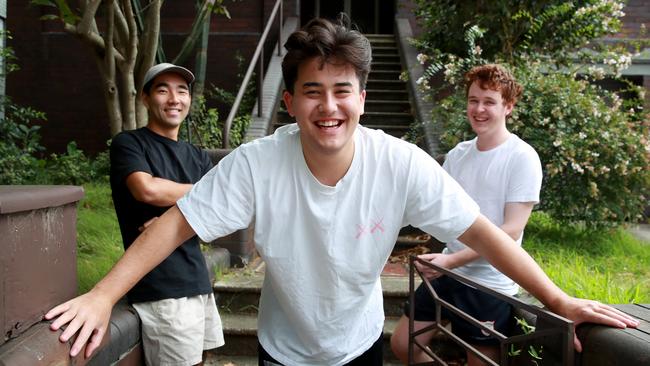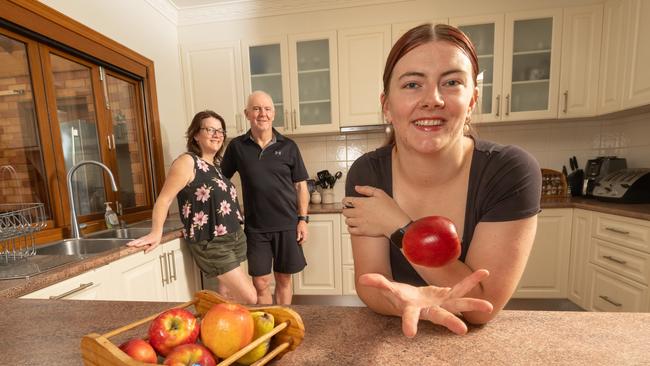Young Aussies struggle with cost of living and can’t pay rent which many rely on their parents for
More young people are delaying moving out of their family home, with some forced to take drastic action as they struggle to make ends meet.
National
Don't miss out on the headlines from National. Followed categories will be added to My News.
Exclusive: University students and housemates Dan McHugh, Harry Chung and Daichi Ito live in a desirable location – but they can only do so because their parents pay their rent.
They’re getting financial help from their family, like a quarter of all 18 to 24 year olds who are renting, according to a national survey conducted last month.
Mr McHugh, 21, said he’s lucky his parents cover his $350 a week rent for a room in Sydney’s eastern suburbs.
“If my parents weren’t helping me out with rent, I’d probably just stay at home in Brisbane,” Mr McHugh said. “I’d seriously reconsider living here in Sydney.”
Mr Chung, 22, said without his parents’ help he would find it hard to continue at university due to the intensity of his medical science course, while Mr Ito, 21, works up to 20 hours a week to pay for food and other bills, while studying full-time.
The annual Big Youth Survey by Year13, an organisation that offers careers advice, found young people are delaying moving out of the family home, even though one in 10 say their parents would really like them to leave.

The survey found more than a quarter plan to move out between the ages of 25 and 29, while three per cent plan to move out after the age of 30 and another three per cent have no plans of leaving at all.
Last year, cost of living and housing pressures saw more than one in seven move back into the family home.
Around a fifth of those under 24 who already have or are looking to buy a home said their parents would help them.
Overall more than a third believe they will rent for life, up from a quarter in 2023, with 67 per cent thinking their chances of buying a home is worse than a year ago.
Those who are not getting financial help from their parents are really struggling.
Taylah Sims, 18, from Melbourne, said she hasn’t enough money to start paying back her student loan let alone save for a house.
“The cost of living crisis has forced me to pick up three jobs in order to stay afloat for rent and utilities,” Ms Sims said.
Gemma Ahearne, 20, who is a part-time receptionist from New Zealand, but whose parents live in Ireland, said she has had a lot of people tell her she will never be able to buy a place, which has been quite disheartening.
Like a quarter of those surveyed, Ms Ahearne is considering moving overseas for cheaper living and housing costs.
Year13 Co-Founder Saxon Phipps said the survey shows an increasing number of young people are losing hope of owning their own home.
“As house prices increase so too does the amount of young people who give up on the dream of owning one and this is playing out in the data with the large year on year spike in young people who see themselves as renting for life,” Mr Phipps said.
‘I’M MAKING MYSELF PUT EVERYTHING ELSE INTO SAVINGS’
— By Grace Frost
Shannon Donelly is one of the many young Melburnians still living at home with her parents, stringently saving in the hope of one day owning her own house.
After graduating from high school, Ms Donnelly jumped straight into working in the sports industry, but said even with a full-time salary for three years, moving out to rent on her own “just wasn’t realistic”.
The 22-year-old said she was “really grateful” for her parents who are letting her live at home rent-free, especially now she has started studying at university.
“My parents have always been really big on pushing me to save money and to save as much as possible,” she said.
“(Money and savings have) always been talked about in my household and my parents do understand how hard it is to move out, to own your own house.
“That’s a big reason why I’m not paying board here.”
Ms Donelly has cut back on seeing her friends and shopping, only spending on the “necessities” like her groceries and petrol, in order to keep her dream of moving out alive.
“I’m making myself put everything else into savings, because otherwise it’s just never possible,” she said.
“If I didn’t have those strict rules, I would just blow through everything I had and there’d be like no savings at the end of it.”
Even still, Ms Donelly fears she’ll never be able to afford a home on her sole income in the volatile market after attaining her degree in conservation and ecosystem management.
“The chances of me owning a house on my own income are probably not really achievable, which does annoy me,” she said.
“I think (owning a home) will probably end up happening, but I don’t know if it’s within the next like 20 years kind of thing.”

SEXISM ON THE RISE
Sexism is on the rise, with almost a third of young people saying they’ve experienced it in the last 12 months.
The Year13 Big Youth Survey found that 32 per cent of people aged 18 to 24 had been victim to sexism in 2024, compared with 27 per cent in 2023.
Monash University feminist researcher Dr Stephanie Wescott said the results are not a surprise, as her own research shows sexism is getting worse.
She blamed the manosphere – a collection of online anti women and anti feminist influencers – for teaching young men a “type of masculinity that is hostile to women and girls”.
“It teaches them how to be cruel, sexist and misogynistic,” Dr Wescott said.
She said these toxic attitudes are linked to violence against women and must be called out.
Dr Wescott said she was part of a study looking at levels of sexism experienced by teachers in Australian schools. They found the overwhelming complainants were women, but there were two men, one who complained about being a victim of homophobia and another about reverse sexism relating to leadership job opportunities.
The Big Youth Survey also found that social media is increasingly being regarded by young people as having a negative impact on their lives, with the number of people thinking that jumping from 49 per cent in 2023 to 56 per cent in 2024.
Digital communications experts at Flinders University, Dr Lisa Harrison, said young people were becoming more aware they’re spending too much time on social media and that scrolling or going down an online “rabbit hole” is not a positive experience.
“This generation is also concerned about the ethical responsibility of some of these tech companies and think they should do more,” Dr Harrison said.
News Corp has successfully won a campaign to raise the age children can access social media to 16.
Like 56 per cent of those her age, Ms Donelly said social media had a mostly negative impact on her life, often finding herself trapped in a cycle of doomscrolling.
“I get myself in like a loop where I can be just stuck on social media and not get off,” she said.
But the 22-year-old said the portrayal of “perfect lives and bodies” on the apps had no impact on her, unlike for many her age.
“I know that a lot of it is fake so I don’t put my attention to it,” she said.
“Once you stop looking at it, it stops coming up on your feed as well.”





